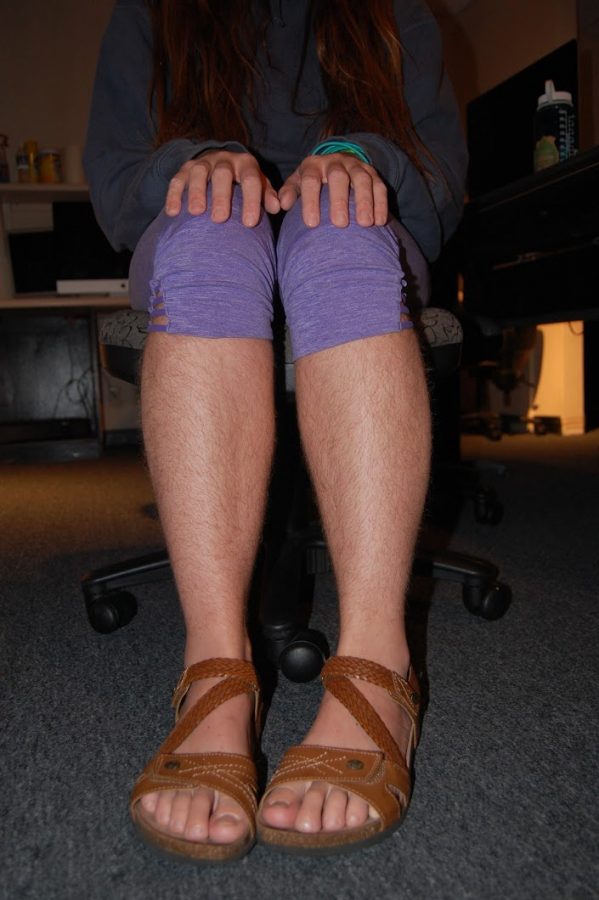To Shave, Or Not To Shave

Environmental Studies senior Katelyn Shedded has been growing out her leg hair since May.
As November comes to an end, men (and some women) will be saying “hello” to their razors and “goodbye” to their overgrown body hair. But Chaminade University Environmental Studies senior Katelyn Shedden goes against societal norms, making every day No-Shave November.
“Shaving is kind of like makeup to me,” Shedden said. “I don’t personally like to wear it, but if you want to, you can wear as much makeup and spend as much money on it as you want to. That’s just not my thing.”
Although she has yet to receive any verbal criticism from her peers regarding her grown-out leg hair, Shedden admits that there have certainly been times when she felt a pressure to shave, especially in middle school and high school. To accommodate, not only her school’s guidelines or her classmate’s standards but the expectations of our society as a whole, Shedden would shave the section of her legs that was visible between her knee-high socks and uniform skirt.
Many women feel pressured by the contrasting expectations that this society holds. From a young age females see advertisements, films, and magazines with photoshopped, air-brushed women who pose an ideal image that is, in reality, unattainable. Women are then told by the media to be curvy yet skinny, clean-shaved but natural, successful but with a lower salary than her husband, etc. These norms have been molding minds for years and are only recently being discussed.
Nowadays, Shedden is working to pursue a career as an Environmental Educator and is cautious as to who she surrounds herself with. She knows to stay away from people who are negative or critical over her long leg hair.
“Being in the outdoor field … it’s OK to show up without makeup and with your hair in a ponytail all the time, which I guess is part of the reason why I like my field,” Shedden said.
Ke‘alohi Canady is a fourth-year Business Marketing student from Honolulu. She knows that she is affected by society’s expectations of women because she shaves to keep an image. If she has to go to an event and look “put together,” she will shave her legs because it provides a “clean” look. Canady thinks it’s twisted she has to take time out of her day to shave in order to make someone else happy.
Sophomore Michaleen Eife is from Alexandria, Virginia, where being “different” is “cool,” so there are many girls who refrain from shaving and wear their body hair proudly. That being said, in the past, she has been with a man who preferred that she shave and told her to do so. Eife thinks it is gross to completely grow out her body hair and therefore makes sure to keep it in check, despite what any significant other thinks. She is also a firm believer that people should do what makes them happy and realizes that there is more to life than one’s outward appearance.
“I’m clean,” Eife said. “It doesn’t put anything on my character just because I don’t shave.”
Peyton Oshiro is a freshman from Nu‘uanu who would be OK with having a girlfriend grow out her body hair. He explained that being hairy is something he could look past, especially when it comes to someone he cared about.
On the contrary, Caleb Meyer, a junior originally from Fayetteville, N.C., knows that men and women should be treated the same but admits that he would feel uncomfortable if he had a girlfriend with outgrown leg hair. Because hairy legs are typically masculine, Meyer would request that his significant other would keep her legs shaved. On the other hand, he thinks armpit hair is less visible and would only become a problem if it started to smell. Meyer recognizes that more women are going against the grain and letting their body hair grow freely outside of No-Shave November. However, in order to make a significant shift toward impartiality, he knows that everyone has to be on the same page.
“Societal norms are breaking down and people are realizing that it’s stupid to hold women to a different standard than men,” Meyer said. “If we are all going to be treated equally, then we should all be treated equally in every aspect. People should be expected to keep the same level of hygiene.”









